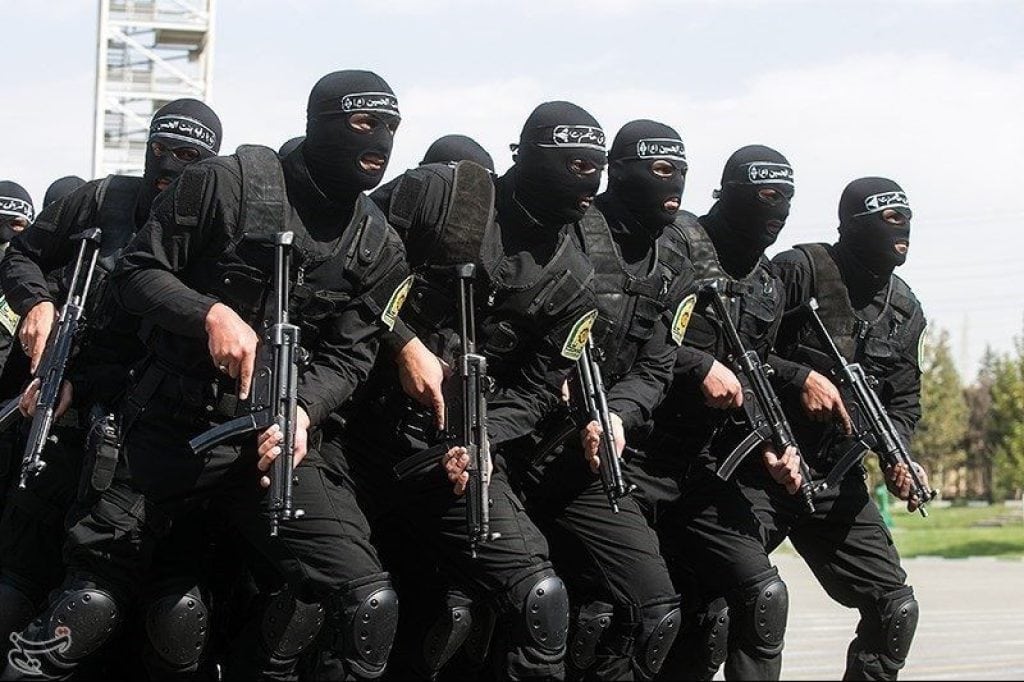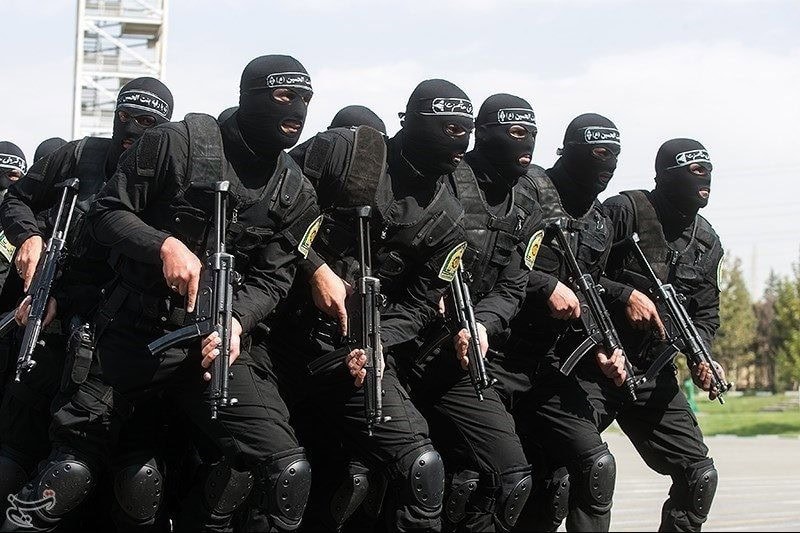 An image from the IRGC-affiliated Tasnim News shows Iranian special forces during a drill.
An image from the IRGC-affiliated Tasnim News shows Iranian special forces during a drill.
The United States, the United Kingdom, and a dozen other European countries issued a statement on July 31, condemning Iran’s escalating extraterritorial intelligence operations across Western countries. The announcement, affirmed by the US, the UK, Albania, Austria, Belgium, Canada, Czechia, Denmark, Finland, France, Germany, the Netherlands, Spain, and Sweden, condemned the Islamic Republic’s plots to “kill, kidnap, and harass people in Europe and North America in clear violation of our sovereignty.”
The statement specifically highlighted the regime’s efforts to outsource violence to Western organized crime networks “to target journalists, dissidents, Jewish citizens, and current and former officials in Europe and North America.”
Tehran is increasingly seeking to obscure its role in orchestrated operations by recruiting criminal syndicates in Europe and the Americas. From Rumba and the designated Foxtrot gang in Sweden to the Hells Angels in Germany and Canada and the drug cartels in the US, the Iranian regime’s footprint is emerging across a broad transnational landscape.
Exploiting a religious institution as cover for influence operations
On July 19, The Times reported that the Ark Islamic Centre in Govanhill, Glasgow—described as a Muslim media, charity, and enterprise hub—had been used by the Islamic Republic of Iran as an electoral outpost during its most recent presidential election. The site, which also hosts the Muslim Council of Scotland, an advisory body to the Scottish government, served twice as an official polling station last summer. Senior UK politicians have since called for a formal inquiry into what they described as Iran’s “malevolent” footprint in Scotland, following the center’s direct involvement in Tehran’s state-managed voting process.
This revelation follows earlier reporting by The Sunday Times that two other Islamic centers in Glasgow—each the recipient of substantial public funding—have maintained overt ties to the Iranian regime. The Ahl al Bait Society Scotland, which received over £400,000 in government grants, held a memorial service for Iranian President Ebrahim Raisi. The Al Mahdi Islamic Center, which has been awarded more than £370,000 in public funds, has displayed the Iranian flag alongside images of Islamic Republic founder Ayatollah Khomeini.
In 2024, German authorities banned the Islamic Center Hamburg (IZH) after concluding that it functioned as an extension of the Iranian regime and served as a conduit for Hezbollah-linked activities. The German Interior Ministry accused the IZH of promoting Islamist extremism and advancing anti-constitutional aims, including the militant propagation of Iranian revolutionary ideology and aggressive antisemitism. The organization, which exerted influence over various mosques and associations, had long been under scrutiny, with years of local calls demanding accountability. The ban followed police raids on 53 properties across multiple federal states—including Bremen, Bavaria, Hesse, and Berlin—that confirmed IZH’s ties to Hezbollah.
Europe’s mounting resistance to Tehran’s ambitions
Although the European Union (EU) has yet to officially designate Iran’s Islamic Revolutionary Guards Corps (IRGC) or Ministry of Intelligence (MOI) as terrorist entities, it sanctioned the Zindashti network, which leads the MOI’s transnational plots, on July 15. Designated jointly by Washington and London in 2024, this terror ring primarily targeted Iranian dissidents in Turkey, Sweden, the UK, Canada, and the US.
Citing over a dozen IRGC and MOI plots to assassinate or abduct UK citizens and residents from January 2022 to August 2023, the UK Parliament’s Intelligence and Security Committee identified the Islamic Republic as a major threat to national security on July 10.
In March and May 2025, Finnish and Swedish intelligence agencies reported Tehran’s growing pattern of operations targeting critics of the regime and Israeli interests across Scandinavia.
The Islamic Republic is forming an intelligence database of Iranian expats
On July 30, the Iranian parliament passed the so-called “Support for Iranians Abroad” bill—a paradoxical title for legislation that mandates the creation of a state-run database on Iranian expatriates. Under Article 5 of the bill, the Ministry of Foreign Affairs is tasked with compiling a comprehensive “information bank” of citizens living outside the country. The government must submit annual reports on the database’s activities to the parliamentary National Security Commission.
Although the bill cites objectives such as improving consular services, attracting talent, and strengthening diaspora ties, the text makes no mention of consent, transparency, or privacy protections. There is no indication that registration is voluntary, nor are there safeguards in place for data collection or individual rights. Despite its official language of support, the measure functions more as a surveillance mechanism—one aimed at tracking, categorizing, and monitoring Iranians abroad under the guise of outreach.
Tehran’s counterintelligence and terror apparatus
Iran’s initiatives are not carried out by a single entity, but rather by a regime apparatus characterized by both internal competition and cooperation that ultimately advance the same agenda. The two main pillars of this terror and repression machinery are the Islamic Revolutionary Guard Corps and the Ministry of Intelligence.
The IRGC has various branches and institutions, including its external arm, the Qods Force (IRGC-QF), its Unit 840, the IRGC Intelligence Organization, and the IRGC Counterintelligence Protection Organization. Similar to other conventional intelligence services, the MOI has numerous offices with various focuses, including the “Martyr Soleimani” headquarters within the US Directorate, which is tasked with avenging the US assassination of former IRGC-QF Commander Qassem Soleimani in 2020.
